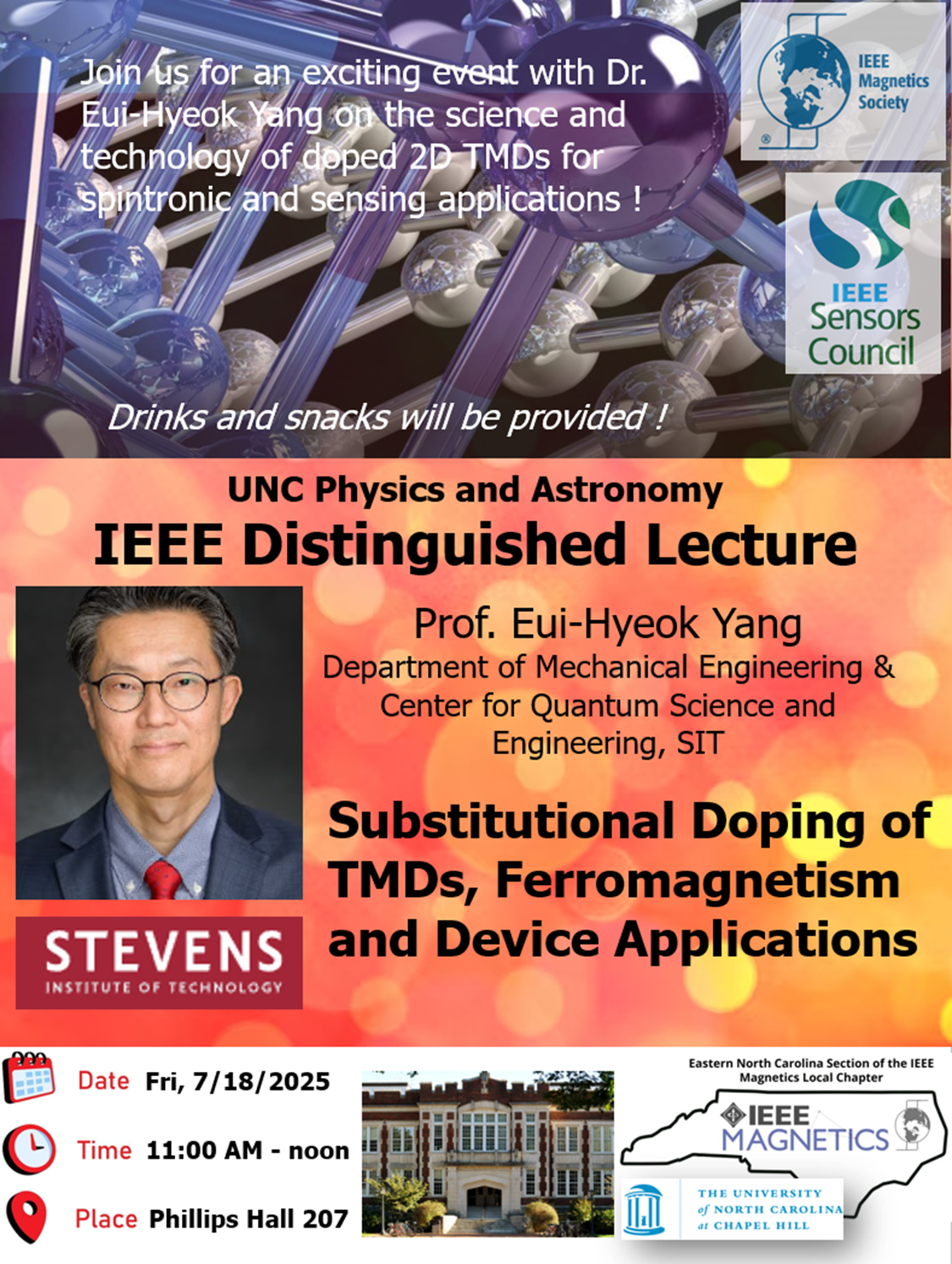IEEE MagSoc NC Chapter Special Seminar and IEEE Sensors Distinguished Lecture - Prof. Eui-Hyeok Yang, Stevens Inst. of Technology
Please join us for an exciting seminar event with Dr. Eui-Hyeok Yang on the science and technology of doped 2D TMDs for spintronic and sensing applications.
Date and Time
Location
Hosts
Registration
-
 Add Event to Calendar
Add Event to Calendar
- 120 E. Cameron Ave, Phillips Hall CB3255, UNC Physics and Astronomy
- Chapel Hill, North Carolina
- United States 27599
- Building: Phillips Hall
- Room Number: 207
Speakers
Substitutional Doping of TMDs, Ferromagnetism and Device Applications
Abstract:
I present our recent work in two-dimensional (2D) transition metal dichalcogenides (TMDs) doped with transition metal atoms, targeting applications in spintronic memory and biosensing. First, I discuss the synthesis, doping, and ferromagnetism in Fe-doped monolayer TMDs, and focus on the spin-orbit torque (SOT) switching. Materials such as those containing heavy metals with strong spin-orbit coupling and topological insulators with spin-momentum locking generate substantial spin currents when subjected to electrical fields. When paired with van der Waals (vdW) magnets, these materials enhance spin-torque transfer efficiency, with the strong perpendicular magnetic anisotropy proving particularly useful for spintronic applications. Thinner vdW magnets are found to improve energy efficiency by enabling closer interaction between the magnetic layers and spin-accumulated interfaces. In our prior work (Nature Communications, 11, 2034, 2020), we introduced Fe-doped monolayer MoS2, which forms a 2D dilute magnetic semiconductor (DMS) capable of operating above room temperature, offering a promising solution for practical SOT applications. Building on this, I present our recent demonstration of highly energy-efficient, field-free, deterministic, and non-volatile SOT switching in Fe-doped monolayer MoS2 deposited on a platinum Hall bar structure. The use of 2D DMS monolayers represents the first demonstration of SOT switching at the true atomic monolayer limit. Additionally, I briefly highlight our work on a peptide-functionalized monolayer MoS₂-based field-effect transistor (FET) designed for highly sensitive and specific virus detection with a low false positive rate. This method shows promise for enhancing the precision of infectious disease diagnoses, leading to the development of effective and accessible diagnostic tools.
Biography:
Biography:
Dr. E. H. Yang is a Professor of the Mechanical Engineering Department at Stevens Institute of Technology. He worked as a Senior Member of the Engineering Staff at NASA's Jet Propulsion Laboratory, participating in the review committee of the Multi-Object Spectrometer for the James Webb Space Telescope. Dr. Yang led several projects funded by NASA, DARPA, and NRO before joining Stevens in 2006. He secured over forty federal grants and contracts totaling approximately $11 million, including funding from the NSF, AFOSR, NRO, and the US Army. Dr. Yang has published over 360 journal and conference papers and has been invited to give more than 120 keynote and invited talks at conferences, workshops, and university seminars. Among other honors, he was awarded the Lew Allen Award for Excellence at JPL in 2003, the Award for Research Excellence at Stevens in 2019 and the IEEE Technical Achievement Award (Advanced Career) from the IEEE Sensors Council in 2020. He is an associate Editor-in-Chief of IEEE Sensors Reviews. He is an IEEE Sensors Council Distinguished Lecturer and IEEE Nanotechnology Council (NTC) Chapter Chair (North Jersey Section). Dr. Yang is a Fellow of the National Academy of Inventors. In 2023, he was awarded the Master of Engineering, Honoris Causa, from Stevens Institute of Technology.

